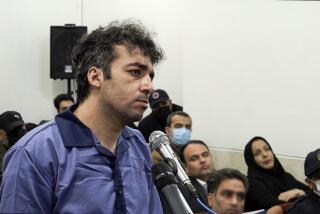3 executed for Bali blasts that killed 202
- Share via
JAKARTA, INDONESIA — Indonesian authorities early today executed three men convicted of helping to plan and carry out bombings that killed 202 people on the resort island of Bali six years ago.
Amrozi bin Nurhasyim, Imam Samudra and Ali Gufron were put to death by firing squad at a maximum security prison on Nusakambangan island at 12:15 a.m., according to a statement by Jasman Panjaitan, a spokesman for Indonesia’s attorney general.
Their bodies were flown by helicopter to their hometowns for burial.
News of the executions brought various reactions in Indonesia. Supporters of the trio prayed and shouted, “God is great!” near a dock that serves as the only gateway to the island prison. The relatives of bombing victims expressed relief in statements to Indonesian news media.
The October 2002 attack on nightclubs in Bali were carried out by two suicide bombers. One man walked into Paddy’s bar and detonated a bomb, killing himself and several other people. Moments later, a second man detonated a car bomb outside the nearby Sari Club, killing nearly 200 people.
Samudra was convicted as a lead organizer and Gufron, whose alias was Mukhlas, of masterminding the attacks. Amrozi was found guilty of buying the van and the potassium chlorate and other materials used to make the explosives.
They intended to target Americans, and eight U.S. citizens were killed in the blasts. But the toll was far higher among Australian tourists; 88 were among the dead.
In the weeks before today’s executions, several Islamist groups held rallies in front of the attorney general’s office in Jakarta to seek a review of the case and visited the homes of the condemned men’s relatives to express support. Family members sold T-shirts carrying the message, “Even if Amrozi and friends are executed, jihad [holy war] will go on.”
The three men had gone to court, first to appeal their convictions and then to argue that they would prefer to be beheaded rather than shot. They failed in both efforts.
Achmad Michdan, one of the lawyers who represented the three men, expressed sadness over the executions, saying the Indonesian government had violated the men’s human rights. “But I am also happy [because] my clients had done what they believed and they believed that this is their duty to God,” he said.
Some analysts questioned whether carrying out the death penalty in the case would have much visible effect on Islamic extremism in Indonesia.
“It won’t further weaken the movement, because the weakening is happening through good law enforcement, penetration of networks,” said Sidney Jones, senior advisor in Indonesia to the International Crisis Group, a think tank. “Not by removal of three men who have been out of circulation for more than five years.”
More to Read
Sign up for Essential California
The most important California stories and recommendations in your inbox every morning.
You may occasionally receive promotional content from the Los Angeles Times.










